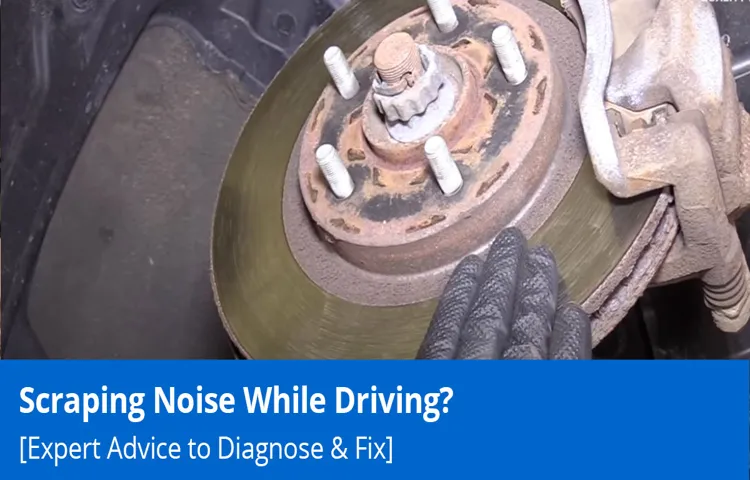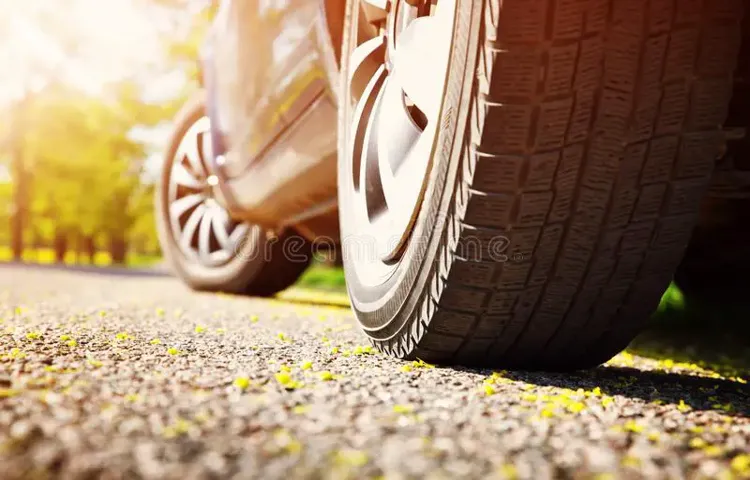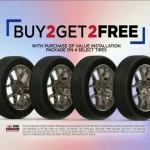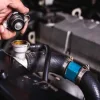Do you hear a rubbing sound when you turn your car? It’s quite common for drivers to experience tire rubbing sounds, and it can be more than just annoying. If left unchecked, it can lead to damaging your tires, suspension, or even steering components. Don’t worry, though.
Solving tire rubbing sounds when turning is not rocket science. With a little effort, you can fix it on your own. In this blog, we’ll walk you through what causes tire rubbing sounds, the different types of sounds, and how to fix them.
So, tighten your seatbelt, and let’s get started!
Table of Contents
Understanding the Issue
If you hear a tire rubbing sound when turning your vehicle, it could indicate a problem with your tires or suspension system. This issue is usually caused by the wheels rubbing against the wheel well or the suspension components rubbing against the tires while turning. One common cause of tire rubbing is worn-out suspension parts such as struts, ball joints, and control arms.
Another potential cause is an oversize tire or wheel that rubs against the fender liner or wheel well while turning. Driving with this issue can compromise your safety, and it’s important to have a mechanic inspect your vehicle as soon as possible. A professional mechanic can diagnose the problem and provide a solution tailored to your vehicle and repair needs.
What Causes Tire Rubbing Sounds When Turning?
Have you ever heard a strange rubbing sound when turning your car’s steering wheel? If so, it could be a sign of tire rubbing, a fairly common issue that can occur due to a variety of factors. Perhaps the most common cause of tire rubbing sounds when turning is a low tire pressure, which can cause the tire to flatten and rub against the wheel well. You may also experience rubbing if your car’s suspension system is worn down or damaged, causing your wheels to shift and scrape against the car’s body.
It’s important to get this issue checked out as soon as possible to prevent further damage and ensure your safety on the road. So next time you hear that rubbing sound when turning, don’t ignore it – take your car in for a checkup and make sure your vehicle’s tires and suspension system are in good working order.

How Dangerous are Tire Rubbing Sounds?
Tire rubbing sounds can be a cause for concern for drivers, but how dangerous are they? Well, it depends on the severity and duration of the sound. If the sound is intermittent and not too loud, it may just be a minor issue that can be fixed by adjusting the tire pressure or realigning the wheels. However, if the sound is constant and accompanied by a strong burning smell or smoke, it could indicate that the tire is rubbing against a part of the car or it’s about to blow out.
In this case, it’s essential to pull over immediately and avoid driving until the issue has been resolved. Not only is it dangerous to continue driving, but it can also cause irreversible damage to the tire and your car’s suspension system. Therefore, if you hear any tire rubbing sounds, it’s always best to get them checked out by a professional to ensure your safety on the road.
Diagnosing the Problem
If you hear a tire rubbing sound when turning, the first thing to do is inspect the tires for any signs of damage or wear. Look for uneven tread wear or any foreign objects lodged in the tire. It’s also possible that the rubbing sound is caused by a problem with the suspension or steering components.
Check the ball joints, tie rod ends, and control arms for any signs of damage or wear. Additionally, if the rubbing sound only occurs when turning in a specific direction, it may be due to a problem with the wheel bearings on that side of the vehicle. Have a mechanic inspect the vehicle to diagnose the problem and determine the necessary repairs.
Don’t ignore the issue as it could potentially lead to more serious problems down the road.
Steps to Determine the Cause of Tire Rubbing Sounds
Diagnosing the Problem: If you hear strange sounds coming from your tires, don’t ignore them; they could indicate a serious problem. The most common cause of tire rubbing sounds is worn or damaged wheel bearings. You should check them as soon as possible to avoid serious damage.
Another possible cause of a rubbing sound is a warped rotor, which can cause your vehicle to vibrate when you brake. This type of problem can be dangerous, so it’s important to address it quickly. Also, a tire rubbing against the fender or another component of the vehicle can cause a rubbing sound.
This is often due to worn suspension components or a loose wheel. A simple inspection will help you diagnose the root cause of a rubbing sound. By verbally acknowledging the rubbing sound and taking action promptly, you can save yourself from a more significant and expensive repair.
How to Safely Inspect Your Tires and Wheels
“inspect tires and wheels” Diagnosing the problem with your tires and wheels is an essential step in maintaining your vehicle’s safety and performance. Knowing what to look for can save you time, money, and even prevent accidents. Start by inspecting the tread depth, wear patterns, and any visible damage such as cuts, gouges, or punctures.
Uneven wear may indicate an alignment issue that needs to be addressed. Shake the wheels to check for any excessive play that could indicate loose lug nuts or worn bearings. Check the tire pressure and make sure it matches the manufacturer’s recommendation.
Driving on underinflated tires could cause unnecessary wear and lower your car’s fuel efficiency. Inspecting your tires and wheels regularly can help you identify issues before they become costly problems, so make it a part of your maintenance routine.
What to Look for When Examining Your Tires
When examining your tires, it’s important to look for any signs of wear and tear. Start by checking the tread depth, which should be at least 2/32 of an inch. If it’s less than that, it’s time to get new tires.
Additionally, examine the sidewalls for any cracks or bulges, which can indicate that the tire is weak and may be prone to blowing out. Another thing to look for is uneven wear patterns, which can occur due to misalignment or improperly inflated tires. Finally, inspect the tire for any debris or punctures, which can lead to a flat or blowout.
By regularly examining your tires for these issues, you can catch any problems early on and ensure that your vehicle is safe to drive.
Solutions for Tire Rubbing Sounds
If you’re experiencing a tire rubbing sound when turning your vehicle, it’s important to address the issue promptly before it leads to bigger problems. One potential solution is to check your tire pressure, as under-inflated tires can cause rubbing. Another common cause is worn suspension components, such as overly worn control arm bushings or ball joints.
Uneven tire wear can also cause rubbing sounds, indicating that your tires need to be rotated or replaced. If none of these solutions fix the issue, it may be necessary to take your vehicle to a mechanic for a more detailed inspection. Neglecting the problem can lead to further damage, so it is important to address the issue as soon as possible.
Don’t let a small sound turn into a big problem- make sure to get your vehicle checked out if you hear a tire rubbing sound.
When to See a Professional Mechanic
Tire Rubbing Sounds If you’re experiencing a tire rubbing sound that’s been persistent, it may be time to see a professional mechanic. Though it’s easy to mistake tire rubbing sounds with other problems, certain clues can help you differentiate between them. For instance, if the sound persists when you’re turning, it’s likely that the issue lies in your suspension system.
Conversely, if the sound is more prominent when you’re driving straight, it could be a tire-related problem causing the noise. Either way, it’s important to seek out professional advice. Not only can a mechanic diagnose the problem, but they can also take action to prevent further damage or safety concerns.
In some cases, tire rubbing sounds can be indicative of more severe issues like worn-out brake pads or wheel bearings. By addressing the issue early, you can avoid more expensive repairs down the line and ensure your safety on the road. So, if you’re hearing tire rubbing sounds, don’t let them go unnoticed.
Contact a professional mechanic, and get a solution before the problem magnifies.
Repairing the Issue Yourself
If you’re experiencing tire rubbing sounds, don’t worry! There are a few solutions you can try before heading to the mechanic for a costly repair. The first step is to check if there is anything stuck in the tires such as stones, pebbles, or debris. If so, simply remove them and this may solve the problem.
Another possibility is that the tire pressure is too high or low, causing wear or pressure on the tire that leads to rubbing sounds. Check your owner’s manual for the recommended tire pressure and adjust accordingly. Additionally, make sure that the wheels are properly aligned and that the tires are not excessively worn down.
By checking these things yourself, you can save time and money while ensuring that your vehicle is running smoothly on the road.
Preventative Measures
If you’ve noticed a tire rubbing sound when turning, it’s essential to take preventative measures to avoid further issues. One potential cause of this sound could be worn out wheel bearings, which can cause the tire to rub against the surrounding components. Regularly maintaining and replacing worn-out parts is crucial to prevent further damage to your vehicle.
Additionally, make sure to check your tire pressure and alignment regularly to ensure that there are no other underlying issues. Ensuring that your tires and wheels are appropriately balanced can also help to prevent any rubbing or other issues. Taking preventative measures and regularly inspecting your vehicle can save you time and money in the long run, and keep you safe on the road.
Best Practices for Maintaining Healthy Tires
When it comes to maintaining healthy tires, preventative measures are key. One simple step is to regularly check the pressure of your tires by using a pressure gauge, as under or over-inflated tires can lead to uneven tread wear and poor handling. Additionally, it’s important to regularly inspect your tires for any signs of damage such as punctures, cuts, or bulges which can cause a blowout and potentially dangerous situations on the road.
Simple actions like avoiding sudden stops and starts and driving at the correct speed limit can also help extend the life of your tires. Remember, taking care of your tires not only ensures a safer driving experience but also saves you money in the long run. So, make sure to incorporate these preventative measures into your routine to keep your tires in top-notch condition.
How to Properly Align Your Wheels
When it comes to properly aligning your wheels, taking preventative measures can save you time and money in the long run. Regularly checking your tire pressure and ensuring your tires are rotated and balanced can help prevent uneven wear and tear, which can lead to misaligned wheels. Additionally, avoiding potholes and rough terrain can reduce the likelihood of damage to your wheels and suspension.
By staying proactive with your wheel maintenance, you can avoid the inconvenience and expense of a more serious alignment issue down the road. So, next time you hit the road, take some time to give your wheels some TLC to keep them running smoothly.
Conclusion
In conclusion, the tire rubbing sound when turning is like the annoying cousin who always seems to show up at family gatherings. They’re difficult to ignore and tend to ruin the experience for everyone involved. However, with a bit of investigation and maintenance, this pesky sound can be silenced and the ride can once again be smooth and enjoyable.
So next time you hear that rubbing sound, don’t panic, just roll with it and get it taken care of before it becomes a bigger problem. After all, life is too short to let your car drive you crazy.”
FAQs
What could be causing a tire rubbing sound when turning?
A tire rubbing sound when turning could indicate worn or damaged tires, worn brake pads, or suspension issues. It is important to have the vehicle inspected by a professional mechanic to determine the exact cause.
Can tire pressure affect the occurrence of a tire rubbing sound when turning?
Yes, low tire pressure can cause the tire to deform and rub against the wheel well or other components, resulting in a rubbing sound when turning.
Is it safe to drive with a tire rubbing sound when turning?
No, it is not safe to drive with a tire rubbing sound when turning. This could indicate a serious issue with the vehicle’s tires or suspension and could lead to a dangerous situation while driving.
How can I prevent a tire rubbing sound when turning?
Regular tire maintenance, such as checking tire pressure and rotating tires, can help prevent tire wear and damage that can cause a rubbing sound when turning. Additionally, timely repairs and maintenance of the vehicle’s suspension and brake components can help prevent tire rubbing issues.
Can a tire rubbing sound when turning be fixed?
Yes, a tire rubbing sound when turning can be fixed by identifying and addressing the underlying cause, such as replacing worn or damaged tires or repairing suspension and brake components.
Is it normal for a new vehicle to make a tire rubbing sound when turning?
No, it is not normal for a new vehicle to make a tire rubbing sound when turning. This could indicate a manufacturing defect or premature wear and should be addressed by the dealership or manufacturer.
How much does it cost to fix a tire rubbing sound when turning?
The cost of fixing a tire rubbing sound when turning varies depending on the underlying issue. Repairing or replacing tires can cost anywhere from $50 to $200 per tire, while suspension and brake repairs can cost several hundred dollars or more. It is best to get a professional diagnosis to determine the exact cost of repairs.



